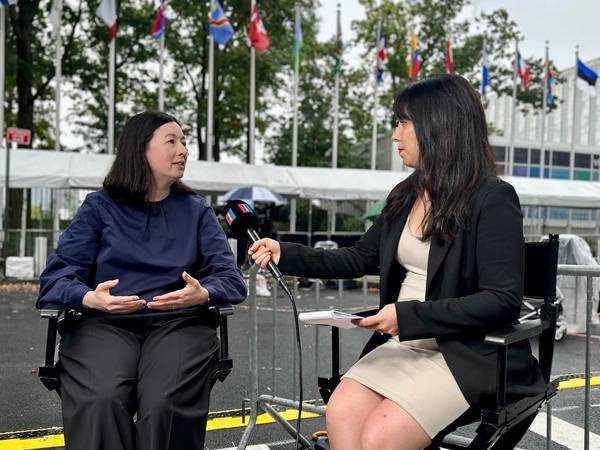The United States will judge Iran’s new president by actions not words, a senior state department official told Iran International on Thursday, in the first US reaction to Masoud Pezeshkian’s debut address at the United Nations.
"While Iran speaks of change and diplomacy, its actions on the ground—especially its military support for proxies—remain unchanged," US Assistant Deputy Secretary for Iran and Iraq Victoria Taylor said in an interview.
"We are prepared to engage, but Iran has to show it is serious by changing its behavior," she added. "We will continue to use all available tools to hold Iran accountable."
Pezeshkian has been seeking to ease Western sanctions which have hamstrung Iran's economy by presenting a message of reconciliation despite escalating violence between Tehran's armed Islamist allies in the Middle East and Israel.
At his first major event under the global spotlight, Iran's new president told the UN General Assembly on Tuesday that Tehran could work with world powers on a deal over its nuclear program if other parties renewed their obligations to the lapsed agreement.
But Iran's Supreme Leader Ali Khamenei holds the last word on policy and has for decades championed confronting the West and Israel by backing armed Islamist groups like Hezbollah, Palestinian militants and the Houthis in Yemen.
The US government opposes Iran's role in regional conflicts, including its alleged transfer of ballistic missiles to Russia, which Washington and Western allies say could give Moscow greater advantage against Ukraine.
"If Iran truly wants to improve its relationships with the international community including the United States, it needs to take meaningful steps," Taylor added in the interview on the sidelines of the UNGA in New York on Thursday.
As Israel and Iran-backed Hezbollah traded heavier blows this week, the US is working with European and Arab allies to de-escalate the conflict.
Washington has called for a 21-day ceasefire, urging all parties to prevent further escalation into a broader regional war.
"Our efforts are focused on promoting a ceasefire and preventing further destabilization," Taylor added. "Iran can play a constructive role by using its influence with Hezbollah and halting its support for the group."
Zarif’s visa
Asked about concerns raised by US lawmakers about the granting of a visa to Javad Zarif, Iran’s vice-president, to enter the US as part of the country’s delegation to the UN, Taylor said it was a US duty.
"As the host country for the United Nations, we must abide by our legal obligations under the UN Host Country Agreement," she said.
Some Republican members of congress have called on the administration of Joe Biden to refuse entry permits to Iranian officials, some of whom are affiliated with the Islamic Revolutionary Guard Corps or are individually sanctioned like Zarif.
Zarif played a central role in negotiations over the 2015 nuclear deal and was also a key figure in Masoud Pezeshkian’s successful campaign to become president.
Appointed as a Vice President for Strategic Affairs, US-educated Zarif has for years been a main advocate for detente between Iran and the West and conducted several interviews with American media whilst in New York.
